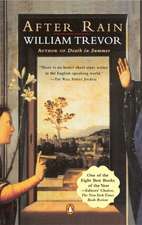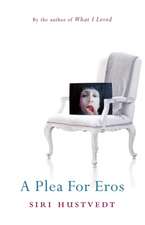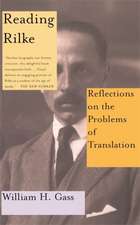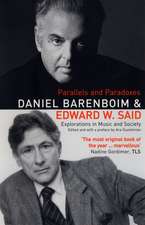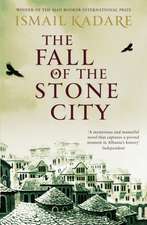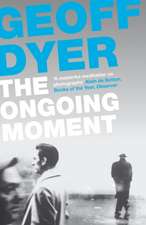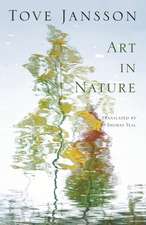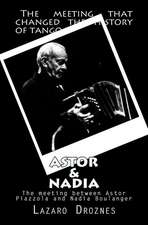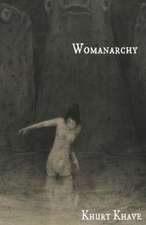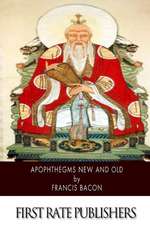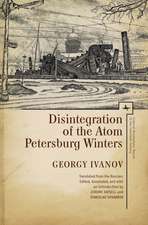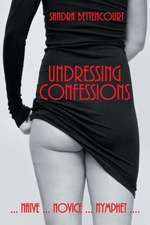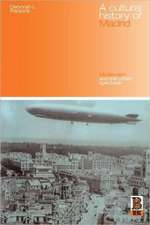Dante: New York Review Books (Paperback)
Autor Erich Auerbach Traducere de Ralph Manheimen Limba Engleză Paperback – 2 feb 2007
CONTENTS
I. Historical Introduction; The Idea of Man in Literature
II. Dante's Early Poetry
III. The Subject of the "Comedy"
IV. The Structure of the "Comedy"
V. The Presentation
VI. The Survival and Transformation of Dante's Vision of Reality
Notes
Index
Din seria New York Review Books (Paperback)
-
 Preț: 89.90 lei
Preț: 89.90 lei -
 Preț: 83.87 lei
Preț: 83.87 lei -
 Preț: 133.15 lei
Preț: 133.15 lei -
 Preț: 87.81 lei
Preț: 87.81 lei -
 Preț: 114.58 lei
Preț: 114.58 lei -
 Preț: 114.52 lei
Preț: 114.52 lei -
 Preț: 62.56 lei
Preț: 62.56 lei -
 Preț: 89.68 lei
Preț: 89.68 lei -
 Preț: 81.74 lei
Preț: 81.74 lei -
 Preț: 175.91 lei
Preț: 175.91 lei -
 Preț: 134.72 lei
Preț: 134.72 lei -
 Preț: 105.30 lei
Preț: 105.30 lei -
 Preț: 106.83 lei
Preț: 106.83 lei -
 Preț: 92.77 lei
Preț: 92.77 lei -
 Preț: 95.05 lei
Preț: 95.05 lei -
 Preț: 100.59 lei
Preț: 100.59 lei -
 Preț: 105.81 lei
Preț: 105.81 lei -
 Preț: 82.93 lei
Preț: 82.93 lei -
 Preț: 97.50 lei
Preț: 97.50 lei -
 Preț: 106.94 lei
Preț: 106.94 lei -
 Preț: 89.68 lei
Preț: 89.68 lei -
 Preț: 146.50 lei
Preț: 146.50 lei -
 Preț: 109.10 lei
Preț: 109.10 lei -
 Preț: 115.05 lei
Preț: 115.05 lei -
 Preț: 92.18 lei
Preț: 92.18 lei -
 Preț: 88.45 lei
Preț: 88.45 lei -
 Preț: 76.50 lei
Preț: 76.50 lei - 35%
 Preț: 65.54 lei
Preț: 65.54 lei -
 Preț: 101.21 lei
Preț: 101.21 lei - 38%
 Preț: 70.32 lei
Preț: 70.32 lei
Preț: 106.32 lei
Nou
Puncte Express: 159
Preț estimativ în valută:
20.35€ • 22.09$ • 17.09£
20.35€ • 22.09$ • 17.09£
Carte disponibilă
Livrare economică 01-15 aprilie
Livrare express 15-21 martie pentru 19.34 lei
Preluare comenzi: 021 569.72.76
Specificații
ISBN-13: 9781590172193
ISBN-10: 1590172191
Pagini: 195
Dimensiuni: 128 x 203 x 13 mm
Greutate: 0.23 kg
Editura: NEW YORK REVIEW OF BOOKS
Seria New York Review Books (Paperback)
Locul publicării:United States
ISBN-10: 1590172191
Pagini: 195
Dimensiuni: 128 x 203 x 13 mm
Greutate: 0.23 kg
Editura: NEW YORK REVIEW OF BOOKS
Seria New York Review Books (Paperback)
Locul publicării:United States
Notă biografică
Erich Auerbach (1892—1957) was born in Berlin, educated at the Universities of Heidelberg and Greifswald, and served in the German army during World War I. A professor at the University of Marburg, Auerbach fled Hitler’s Germany for Istanbul in 1933 and in 1947 moved to the United States, where he taught at Pennsylvania State and Yale.
Michael Dirda is the winner of the 1993 Pulitzer Prize for criticism. He has been an editor and writer for The Washington Post Book World for the past twenty years. He lives in Silver Spring, Maryland.
Ralph Manheim (1907—1992) translated GŸnter Grass, Louis-Ferdinand C?line, Hermann Hesse, and Martin Heidegger, along with many other German and French authors. The PEN/Ralph Manheim Medal for Translation is a major lifetime achievement award named in his honor.
Michael Dirda is the winner of the 1993 Pulitzer Prize for criticism. He has been an editor and writer for The Washington Post Book World for the past twenty years. He lives in Silver Spring, Maryland.
Ralph Manheim (1907—1992) translated GŸnter Grass, Louis-Ferdinand C?line, Hermann Hesse, and Martin Heidegger, along with many other German and French authors. The PEN/Ralph Manheim Medal for Translation is a major lifetime achievement award named in his honor.
Recenzii
"A well-woven garland of luminous details...It is good to welcome back Auerbach's Dante." --Bookforum
"It is arguably the best, if not the easiest, short introduction to Dante and his artistry." --Michael Dirda, from the Introduction
“Auerbach offers the thought that for all its investment in the eternal and immutable, the Divine Comedy is even more successful in representing reality as basically human…The refinement of Auerbach’s own writing about Dante is truly exhilarating to read, not just because of his complex, paradox-filled insights, but because of their Nietzschean audacity.” —Edward Said
A precursor and companion to Erich Auerbach’s majestic Mimesis, Dante: Poet of the Secular World is both a comprehensive introduction to the work of one of the greatest poets and a brilliantly provocative and stimulating essay in the history of ideas. Here Auerbach, acclaimed by writers and scholars as various as Terry Eagleton, Guy Davenport, and Alfred Kazin as one of the greatest critics of the twentieth century, argues paradoxically but powerfully that it is to Dante, supreme among Christian poets, that we owe the concept of the secular world. Dante’s poetry, Auerbach shows, offers an extraordinary synthesis of the sensuous and the conceptual, and individual and the universal, that redefined notions of human character and fate and opened the way into modernity.
“This is a book with all the freshness and excitement of a new discovery. The account of Dante’s poetry possesses a validity which no other book, past and present, can diminish.” —Theodore Silverstein, University of Chicago
"It is arguably the best, if not the easiest, short introduction to Dante and his artistry." --Michael Dirda, from the Introduction
“Auerbach offers the thought that for all its investment in the eternal and immutable, the Divine Comedy is even more successful in representing reality as basically human…The refinement of Auerbach’s own writing about Dante is truly exhilarating to read, not just because of his complex, paradox-filled insights, but because of their Nietzschean audacity.” —Edward Said
A precursor and companion to Erich Auerbach’s majestic Mimesis, Dante: Poet of the Secular World is both a comprehensive introduction to the work of one of the greatest poets and a brilliantly provocative and stimulating essay in the history of ideas. Here Auerbach, acclaimed by writers and scholars as various as Terry Eagleton, Guy Davenport, and Alfred Kazin as one of the greatest critics of the twentieth century, argues paradoxically but powerfully that it is to Dante, supreme among Christian poets, that we owe the concept of the secular world. Dante’s poetry, Auerbach shows, offers an extraordinary synthesis of the sensuous and the conceptual, and individual and the universal, that redefined notions of human character and fate and opened the way into modernity.
“This is a book with all the freshness and excitement of a new discovery. The account of Dante’s poetry possesses a validity which no other book, past and present, can diminish.” —Theodore Silverstein, University of Chicago

